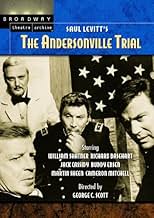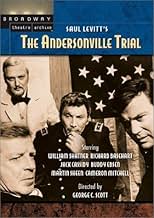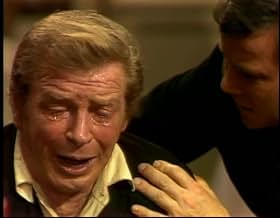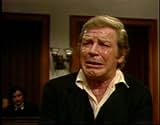A dramatization of the 1865 war-crimes trial of Henry Wirz, commandant of the notorious Confederate POW camp at Andersonville, Georgia.A dramatization of the 1865 war-crimes trial of Henry Wirz, commandant of the notorious Confederate POW camp at Andersonville, Georgia.A dramatization of the 1865 war-crimes trial of Henry Wirz, commandant of the notorious Confederate POW camp at Andersonville, Georgia.
- Won 3 Primetime Emmys
- 4 wins & 2 nominations total
Dal McKennon
- First Guard
- (as Dallas McKennon)
William Bryant
- The Lieutenant
- (as Bill Bryant)
- Director
- Writer
- All cast & crew
- Production, box office & more at IMDbPro
7.7543
1
2
3
4
5
6
7
8
9
10
Featured reviews
Superbly acted, almost forgotten, TV gem
I have not seen this this very fine courtroom drama in almost thirty years, but it remains an unforgettable experience. Basehart, Shatner, Cassidy, Salmi, and Mitchell all give excellent performances. It is also a highly intelligent film, dealing with complex issues of military morality. indeed, it is puzzling that this fine film has never been rerun..then again, most of the great Television dramas are never rerun. Perhaps a new cable network could be created..call it "QTV' for "quality Television', devoted to shows like The Defenders, Naked City, Slatterys People,The Westerner,My World ( And Welcome to It), Nichols and to the great dramas of the golden age, such as this. Of course, thats yet another impossible dream
Impossible to forget
This is one of those rare presentations that one remembers, not only the content, but also the feelings and thoughts that it evoked, even decades after viewing. This is the very best courtroom drama I have ever seen. The captains of the Enterprise and whatever the name of the sub was on Voyage to the Bottom of the Sea (Shatner and Basehart) show what they were capable of doing with first-rate material and direction. Set aside some uninterrupted time to see this one.
An American Auschwitz?
Based on a Broadway play, THE ANDERSONVILLE TRIAL was a made for television production directed by George C. Scott with a number of major performances, led by William Schatner as the Union Prosecutor, and Jack Cassidy as the Southern born defense counsel for Confederate Captain Henry Wirtz (Richard Basehart). The court-martial is headed by General Lew Wallace (Cameron Mitchell), who is determined to bring in a speedy, clean-cut verdict as quickly as possible. Among the witnesses is Albert Salmi, a Union soldier who survived the camp, but who has a dirty secret that clever Jack Cassidy pushes into the faces of the court-martial judges.
Historically some 49,000 Union prisoners were sent to Andersonville, and 13,000 died there under hideous conditions. Food was scarce. They had little in the way of proper shelter. The camp's sanitation was non-existent.
Who was to blame? Well, at the time blame was on Captain Wirtz, who was commander of the camp. All decisions for the sake of the men were in his hands, and the number of dead was too large to ignore. However, the Confederacy in 1863-65 was having trouble feeding it's troops and it's people. Wirtz actually tried to get supplies, but couldn't get far on that. Also, Northern prisons for Confederate prisons, such as Elmira in New York State, were equally vile. Finally, attempts by the South to get a trade of captured soldiers with the North ground to a halt due to the combined refusal of General Grant or Secretary of War Stanton to agree to it (they reasoned the released trained southern soldiers would resume war work, and lengthen the course of the war).
Wirtz would be found guilty, and would be hanged in November 1865. He was the only Confedrate hanged for a war crime (unless you count the four Lincoln Assassination defendants). The play tries to show the impossible situation that fell on Wirtz's shoulders, with him trying to balance his duty to the southern cause, his duty to his prisoners, and his fears of those prisoners. Basehart's agonizing testimony on the stand, where he keeps thinking of the prisoners tunneling and tunneling out of the camp, is still a memory to me yet, thirty five years after I saw it the first time.
But there is more than that in the play. The scene where Mitchell is trying to get the prosecution to concentrate only on the facts, and not give rise to a theory of unchecked universal evils ("A world of Andersonvilles", as Shatner puts it)is wonderful. Mitchell is trying to remind Shatner that all he has to do is prove a case against this defendant. Finally, in disgust, Mitchell asks a hypothetical question to test the loyalty of Shatner to the U.S.: What if the U.S. had supported slavery in 1860 and the South supported abolition? Shatner shatters Mitchell by insisting a greater loyalty would dictate supporting the Confederacy.
Jack Cassidy has some terrific moments attacking the prosecution, which he rightly considers a show trial and an act of hypocrisy. He even gets under Shatner's skin at one point by showing how Shatner - if he gets a conviction - will have something to build a political career on.
All in all it was a terrific moment of televised drama. It has been shown occasionally and it should be shown more.
Oh, by the way. I mentioned the Northern Prison Camp at Elmira, NY. It's commander was Benjamin Tracy. In the post war eras (he died in 1917), Mr. Tracy became a successful corporate lawyer, leading New York State Republican, and Secretary of the Navy under President Benjamin Harrison (1889 - 1893). He is considered by some the father of the modern U.S. Navy. Wirtz, his opposite number, was hanged. Sometime in the 1950s or so, his grave received a new tombstone from some unknown supporter. It gives his name, dates of birth and death, and puts under it, "C.S.A. Martyr". I leave it for the reader to decide what was justice or what wasn't.
Historically some 49,000 Union prisoners were sent to Andersonville, and 13,000 died there under hideous conditions. Food was scarce. They had little in the way of proper shelter. The camp's sanitation was non-existent.
Who was to blame? Well, at the time blame was on Captain Wirtz, who was commander of the camp. All decisions for the sake of the men were in his hands, and the number of dead was too large to ignore. However, the Confederacy in 1863-65 was having trouble feeding it's troops and it's people. Wirtz actually tried to get supplies, but couldn't get far on that. Also, Northern prisons for Confederate prisons, such as Elmira in New York State, were equally vile. Finally, attempts by the South to get a trade of captured soldiers with the North ground to a halt due to the combined refusal of General Grant or Secretary of War Stanton to agree to it (they reasoned the released trained southern soldiers would resume war work, and lengthen the course of the war).
Wirtz would be found guilty, and would be hanged in November 1865. He was the only Confedrate hanged for a war crime (unless you count the four Lincoln Assassination defendants). The play tries to show the impossible situation that fell on Wirtz's shoulders, with him trying to balance his duty to the southern cause, his duty to his prisoners, and his fears of those prisoners. Basehart's agonizing testimony on the stand, where he keeps thinking of the prisoners tunneling and tunneling out of the camp, is still a memory to me yet, thirty five years after I saw it the first time.
But there is more than that in the play. The scene where Mitchell is trying to get the prosecution to concentrate only on the facts, and not give rise to a theory of unchecked universal evils ("A world of Andersonvilles", as Shatner puts it)is wonderful. Mitchell is trying to remind Shatner that all he has to do is prove a case against this defendant. Finally, in disgust, Mitchell asks a hypothetical question to test the loyalty of Shatner to the U.S.: What if the U.S. had supported slavery in 1860 and the South supported abolition? Shatner shatters Mitchell by insisting a greater loyalty would dictate supporting the Confederacy.
Jack Cassidy has some terrific moments attacking the prosecution, which he rightly considers a show trial and an act of hypocrisy. He even gets under Shatner's skin at one point by showing how Shatner - if he gets a conviction - will have something to build a political career on.
All in all it was a terrific moment of televised drama. It has been shown occasionally and it should be shown more.
Oh, by the way. I mentioned the Northern Prison Camp at Elmira, NY. It's commander was Benjamin Tracy. In the post war eras (he died in 1917), Mr. Tracy became a successful corporate lawyer, leading New York State Republican, and Secretary of the Navy under President Benjamin Harrison (1889 - 1893). He is considered by some the father of the modern U.S. Navy. Wirtz, his opposite number, was hanged. Sometime in the 1950s or so, his grave received a new tombstone from some unknown supporter. It gives his name, dates of birth and death, and puts under it, "C.S.A. Martyr". I leave it for the reader to decide what was justice or what wasn't.
Worth it
I watched this on TV when I was 13 or 14 yrs old and was engrossed in it. It left a lasting impression on me. Even to this day, I still think about it. As a kid, I couldn't have told you if the acting was first rate. Evidently it was; I do remember thinking the actors presented it as if the story had happened to them. I also remember being aware that William Shatner was remarkably restrained in this role and thinking how convincing he was.
I can't say this particular movie sparked my interest in American history, but it certainly looms large. Even if the story has been "Hollywood-ized" with the addition of bogus testimony of the camp commandant, the rest of the story is quite true. The sad story of Civil War POW's at Camp Sumter (the actual name of the prison) should be studied by all, not just students of American history. Incidentally, the Andersonville National Historic Site (outside of Richmond, VA) is the only national park that serves as a memorial for ALL American POW's. Because of having seen this movie, I sought out more info about the actual place and actual facts. This doesn't necessarily prove it's a well made movie, but it's the highest compliment I can pay to The Andersonville Trial.
To me, the time invested in watching this movie is worth it.
I can't say this particular movie sparked my interest in American history, but it certainly looms large. Even if the story has been "Hollywood-ized" with the addition of bogus testimony of the camp commandant, the rest of the story is quite true. The sad story of Civil War POW's at Camp Sumter (the actual name of the prison) should be studied by all, not just students of American history. Incidentally, the Andersonville National Historic Site (outside of Richmond, VA) is the only national park that serves as a memorial for ALL American POW's. Because of having seen this movie, I sought out more info about the actual place and actual facts. This doesn't necessarily prove it's a well made movie, but it's the highest compliment I can pay to The Andersonville Trial.
To me, the time invested in watching this movie is worth it.
First-rate historical drama
A wonderful TV movie about the most notorious of the "concentration camps" of the American Civil War. It has a first-rate cast, with Richard Basehart giving an especially intense performance as the camp commandant. I hope some day it comes out on video or is rebroadcast, perhaps by the History Channel.
Did you know
- TriviaAll of the witnesses as portrayed in the film are the actual witnesses who testified at Wirz's trial, and their dialogue in many cases is taken almost verbatim from the trial transcript. The major change from history is that Wirz did not testify and the whole "moral issue", around which this film revolves, was never raised at the trial.
- GoofsEarly on, a captain played by Martin Sheen comes into the court to tell Gen. Wallace that the defendant tried to hurt himself. The crossed sabers insignia of the cavalry on Sheen's cap is upside down.
- ConnectionsFeatured in The 23rd Annual Primetime Emmy Awards (1971)
Details
Contribute to this page
Suggest an edit or add missing content






































